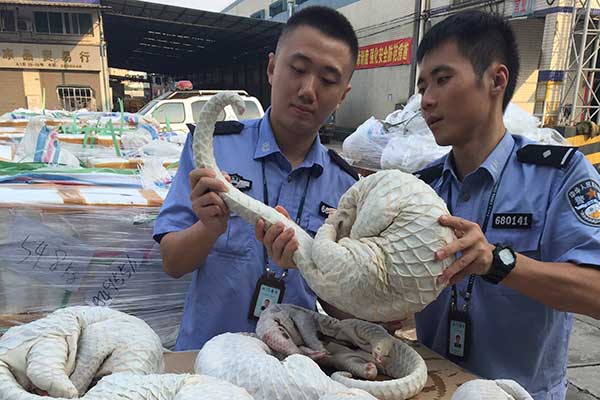Bird flu vaccines set to undergo clinical trials
Four kinds of vaccine for the H7N9 strain of bird flu virus have been approved for clinical trials by China’s top drug regulator, according to the Beijing Food and Drug Administration.
|
|
|
The China Food and Drug Administration. [File photo/Xinhua] |
The administration will continue to provide assistance and guidance for clinical trials of the vaccines so they can enter the market as soon as possible, it said in a statement last week.
Beijing Tiantan Biological Products Co, a State-owned enterprise in Beijing, which developed the vaccines, announced on Wednesday that the China Food and Drug Administration had approved clinical trials. The company added that it must conduct other procedures after the completion of clinical trials before the vaccines can be sold on the market, including applying for registration of the drugs and acquiring certificates for their manufacture from the CFDA.
There are currently no vaccines for the H7N9 strain of bird flu-which is most active in winter and spring-available on the market in China or overseas, although several other domestic companies have also acquired approval from CFDA for clinical trials for similar products, Beijing Tiantan said.
Two human cases of H7N9 have been reported in Beijing this year, with both patients suspected of having been exposed to live poultry markets. Both are in critical condition, the Beijing Center for Disease Control and Prevention said last week.
A 41-year-old woman infected with the H7N9 strain of bird flu in Nanning, Guangxi Zhuang autonomous region, died on Sunday, the regional Health and Family Planning Commission said.
The central government has intensified measures to control the spread of H7N9, including shutting down live poultry markets, according to the National Health and Family Planning Commission. The commission called on the public to take precautionary measures such as avoiding contact with live poultry and cooking chicken meat thoroughly.
Human cases of H7N9 have been reported in 16 provinces in China since October, including in Yunnan, Fujian, Hubei and Hunan provinces, with most of them involving exposure to live poultry markets, according to the commission.
In January alone, 192 human cases of H7N9 were reported on the Chinese mainland, including 79 deaths, making it the worst period since the virus first appeared in China in 2013, the commission said.
There is no evidence to support sustained human-to-human transmission of the virus, which was first reported in the spring of 2013, according to the World Health Organization.
The Beijing Center for Disease Control and Prevention said last week that more sporadic cases are expected in the city.
Sporadic cases of the bird flu may last until late April, said Ni Daxin, deputy director of emergency response at the Chinese Center for Disease Control and Prevention.
![The China Food and Drug Administration. [File photo/Xinhua] The China Food and Drug Administration. [File photo/Xinhua]](http://images.china.cn/attachement/jpg/site1007/20170220/001fd04cf03a1a14ab4b01.jpg)

